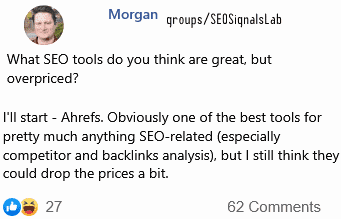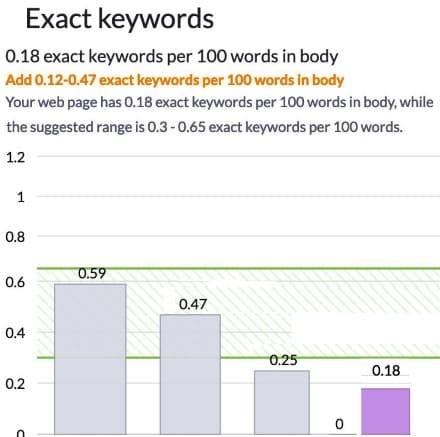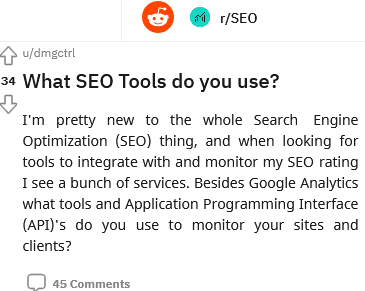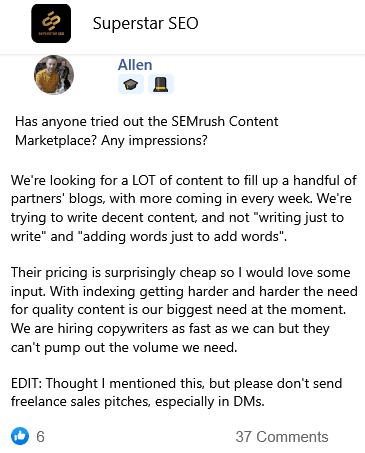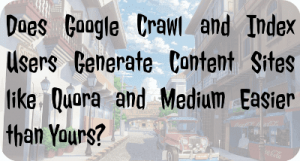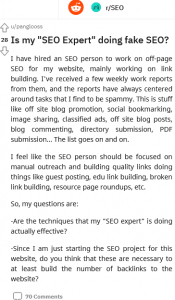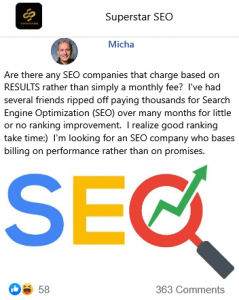Ralph
On my website I'm linking out to a lot of websites with a low Domain Authority (DA). Do you guys think making these links no-follow will increase my own DA? In other words, does linking out to low DA/spammy websites hurt your own DA? 🎉
2 🤭2 😢1 👍🏽618 💬🗨
On my website I'm linking out to a lot of websites with a low Domain Authority (DA). Do you guys think making these links no-follow will increase my own DA? In other words, does linking out to low DA/spammy websites hurt your own DA? 🎉
2 🤭2 😢1 👍🏽618 💬🗨
📰👈
Ammon Johns 🎓
Domain Authority (DA) is a third-party metric from Moz that tends to have a bad reputation as it is the main thing that the absolute worst quality 'link builders' and 'guest posting' services will cite, despite it having no direct correlation to the value of ANY specific link.
DA is a domain level metric, not a page-level one, and Google don't have any equivalent or use for a domain level metric. They only use page-level in PageRank.
Link equity, under all systems, whether third part or Google's own, gain from links *to* your page, and NOTHING else. More links means more 'juice' from them. Outbound links do not decrease or lower the page's value, ever.
It is simply that some people want all of the power of their links flowing as inbound links to their own other pages, helping their value, so that the inbound links to the first page from those may likewise have more value.
However, this is usually a tiny, tiny percentage of difference *per page*. So lets say your average page has just a tiny 20 total links on it (on it, not to it) as your navigation around a fairly small site. Each link would be getting 1/20th of the passable value, or 5%. Now imagine adding 5 outbound links on one of your pages. There are now 25 total links on the page, each passing 1/25th of the passable value, or 4%.
Until you have a mass of really high value links where even a fraction of a fraction has scaled to a decent amount, you are far, far better off spending time on earning new links, than on worrying for even a moment about 'leaking' link juice.
💟6
Domain Authority (DA) is a third-party metric from Moz that tends to have a bad reputation as it is the main thing that the absolute worst quality 'link builders' and 'guest posting' services will cite, despite it having no direct correlation to the value of ANY specific link.
DA is a domain level metric, not a page-level one, and Google don't have any equivalent or use for a domain level metric. They only use page-level in PageRank.
Link equity, under all systems, whether third part or Google's own, gain from links *to* your page, and NOTHING else. More links means more 'juice' from them. Outbound links do not decrease or lower the page's value, ever.
It is simply that some people want all of the power of their links flowing as inbound links to their own other pages, helping their value, so that the inbound links to the first page from those may likewise have more value.
However, this is usually a tiny, tiny percentage of difference *per page*. So lets say your average page has just a tiny 20 total links on it (on it, not to it) as your navigation around a fairly small site. Each link would be getting 1/20th of the passable value, or 5%. Now imagine adding 5 outbound links on one of your pages. There are now 25 total links on the page, each passing 1/25th of the passable value, or 4%.
Until you have a mass of really high value links where even a fraction of a fraction has scaled to a decent amount, you are far, far better off spending time on earning new links, than on worrying for even a moment about 'leaking' link juice.
💟6
Ralph ✍️
Ammon, thank you so much! Really appreciate that you took the time to give me this comprehensive answer! 😃 😃
Ammon Johns 🎓 » Ralph
You're welcome.
Josh McAdams » Ammon Johns
What about CheiRank?
Ammon Johns 🎓 » Joshua
Do adult sites use W*nkBankRank?
🤭
Josh McAdams
Josh McAdams
Is this dead at Google?
Josh McAdams » Ammon Johns
Is this dead at Google?
Asking a serious question.
Ammon Johns 🎓 » Joshua
I wouldn't even be certain it had ever been used at Google for certain. Many, many alternate versions, modifications, or slight changes on the theme of PageRank have been proposed across the years. Some of them like Hilltop, TrustRank, or Topic-Sensitive PageRank (TSPR) extensively discussed, but not all are actually from Google at all (Microsoft and Yahoo have both created papers on PageRank modifications, others have come from Universities, etc.)
Even in the cases where we are fairly certain Google have used an algorithm like these, say Hilltop, it seems likely that they would not be universal, but rather used in specific query types, or for specific sub-functions (there are likely several specific link analysis algorithms in Panda not used in ranking).
CheiRank looks at the link flow almost the opposite way as PageRank, and might indeed be specifically good for detecting spam deriving from reciprocal links and from PBNs. But it's application to rankings would seem to be in finding Hubs rather than Authorities. i.e. for find sites that link to good stuff, rather than contain good stuff of their own.
Josh McAdams » Ammon Johns
Thank you, good explination
Ammon, thank you so much! Really appreciate that you took the time to give me this comprehensive answer! 😃 😃
Ammon Johns 🎓 » Ralph
You're welcome.
Josh McAdams » Ammon Johns
What about CheiRank?
Ammon Johns 🎓 » Joshua
Do adult sites use W*nkBankRank?
🤭
Josh McAdams
https://en.Wikipedia.org/wiki/CheiRankJosh McAdams
Is this dead at Google?
Josh McAdams » Ammon Johns
Is this dead at Google?
Asking a serious question.
Ammon Johns 🎓 » Joshua
I wouldn't even be certain it had ever been used at Google for certain. Many, many alternate versions, modifications, or slight changes on the theme of PageRank have been proposed across the years. Some of them like Hilltop, TrustRank, or Topic-Sensitive PageRank (TSPR) extensively discussed, but not all are actually from Google at all (Microsoft and Yahoo have both created papers on PageRank modifications, others have come from Universities, etc.)
Even in the cases where we are fairly certain Google have used an algorithm like these, say Hilltop, it seems likely that they would not be universal, but rather used in specific query types, or for specific sub-functions (there are likely several specific link analysis algorithms in Panda not used in ranking).
CheiRank looks at the link flow almost the opposite way as PageRank, and might indeed be specifically good for detecting spam deriving from reciprocal links and from PBNs. But it's application to rankings would seem to be in finding Hubs rather than Authorities. i.e. for find sites that link to good stuff, rather than contain good stuff of their own.
Josh McAdams » Ammon Johns
Thank you, good explination
Ammon Johns 🎓
The above comment from me addresses the math and the mechanics. But there is another consideration, and that is Trust. Links are content. Links to crap are thus crap content. Links to awesome are awesome content.
If you link to spammy sites, and Google's signals and algorithms know those are spammy sites, think what that does to Google's assessment of your Expertise, Authority, and Trust.
Ralph ✍️ » Ammon Johns
Fair point! I wouldn't necessarily call them spammy, but they might have low Domain Authorities (DA)s. On my website I'm talking (and linking to) cool website designs. Some designs might be cool, but have a DA of 4. Hence my question 😃
Ammon Johns 🎓 » Ralph
The only real use of DA is to look at the differences between DA and PA to determine whether the overall value of ALL links to all pages of the site is being distributed to the specific pages you want to have the power. No other value at all.
In everything else, page-level values are what counts, and even then, the passable value is the fraction of ALL links on that page. Meaning that if you get a link as one of a 'top 50 sites' list on a page, and that page had navigation links in a nested menu to 50 other pages and categories, so 100 links total on the page, each link is worth around 1% of the passable value of the page.
I mention passable value because PageRank has an inbuilt 'Damping Factor' that causes a percentage of link value to be 'lost' or evaporated at each page. In the original papers this was given in examples as 15%. However, the same papers stated it could be many other values, including dynamic ones, or even based on a seed page.
Fair point! I wouldn't necessarily call them spammy, but they might have low Domain Authorities (DA)s. On my website I'm talking (and linking to) cool website designs. Some designs might be cool, but have a DA of 4. Hence my question 😃
Ammon Johns 🎓 » Ralph
The only real use of DA is to look at the differences between DA and PA to determine whether the overall value of ALL links to all pages of the site is being distributed to the specific pages you want to have the power. No other value at all.
In everything else, page-level values are what counts, and even then, the passable value is the fraction of ALL links on that page. Meaning that if you get a link as one of a 'top 50 sites' list on a page, and that page had navigation links in a nested menu to 50 other pages and categories, so 100 links total on the page, each link is worth around 1% of the passable value of the page.
I mention passable value because PageRank has an inbuilt 'Damping Factor' that causes a percentage of link value to be 'lost' or evaporated at each page. In the original papers this was given in examples as 15%. However, the same papers stated it could be many other values, including dynamic ones, or even based on a seed page.
📰👈
Moz DA and Ahrefs DR get Marked as Third Party, but How Useful are they?
Embed this to your blogs! Then visit Ke-1.com anytime!



